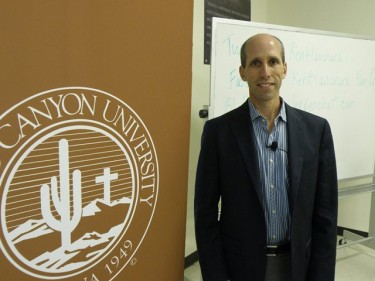By Doug Carroll
GCU News Bureau
Even a company whose business is leadership needs to re-evaluate the effectiveness of its product.
That was the situation faced by the Ken Blanchard Companies less than two years ago, when "we were kind of losing steam," according to Howard Farfel, president of the business founded in 1979 by Dr. Ken Blanchard, the servant-leadership guru and author of "The One-Minute Manager."
Farfel, the guest speaker Tuesday night in the second installment of the KBCOB Leadership Series, said the family-owned business decided to take a hard look at itself. The Ken Blanchard Companies employs more than 300 researchers, consultants and facilitators in San Diego and around the world. Its clients and partners include Coca-Cola, Nissan, Apple, American Express, Wells Fargo and Grand Canyon University, where the business college bears Blanchard's name.
An expert in innovation was retained to help with the process, Farfel said, and an intense re-examination began with the mission statement ("Unleash the potential and power of people and organizations for the greater good") and values (ethical behavior, relationships, success, learning). The firm was interested in meeting a growing demand for customized learning, along with accommodating the diverse needs of small companies and multinational organizations. It wanted to become more effective in using new technology.
"One model wasn't working anymore," said Farfel, who has been with Blanchard for 13 years.
As part of the process, he said, key issues were identified, research was performed, readiness for change was assessed and large-group input was solicited from Blanchard employees. Strengths were seen as creativity, a consensus orientation, moderate risk-taking and high cause motivation. A weakness was inconsistent follow-through on ideas.
Three "stages" of the business -- mature, growth and creation -- helped in the ranking of priorities. Traditional training, which long has been the company's calling card, was considered mature and in need of less attention than potential growth areas such as government and global leadership. E-learning and education fell into the creation category, relatively new in development.
"I think we're on our way to success," said Farfel, adding that an accurate determination of readiness is the most important aspect of change.
He said it's not always easy being a leader in a leadership company.
"My most challenging thing is modeling all the things we teach," Farfel said. "It's not like people are trying to catch me slipping up. But there is a standard that Ken and the company have set."
The series will resume at 5:30 p.m. next Tuesday with Blanchard speaking on the language of leadership. For more information, email Helen Hammond at [email protected].
Contact Doug Carroll at 639.8011 or [email protected].




































































